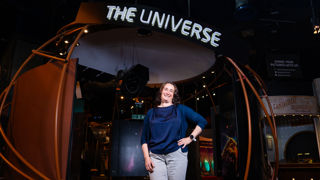
Meet our New Space Experts – Dr Sarah Casewell
- 30th May 2024
- Author: Elliott Langley - Marketing Administrator
We are so lucky to have such a skilled and intelligent team who ensure that everything we teach our visitors about space is both accurate and accessible. From our Discovery team, who help schools groups and visitors learn about space, to our teachers in the National Space Academy, we have an incredible array of experts within our team. But sometimes, you just have to call in the specialists!
That's why we now have not one, not two, but four designated Space Experts from our close friends at the University of Leicester, who are ready to provide their vast knowledge about more in depth STEM subjects.
I’ll be interviewing each of our new Space Experts to understand the role they play and how they came to play such a vital role in their fields. Hopefully I’ll be coming out of these sessions a little smarter and a bit closer to being an expert myself!
For the first of these Meet our Space Experts blog posts, I met with Dr Sarah Casewell, an observational astronomer and regular guest speaker at our Space Lates events.
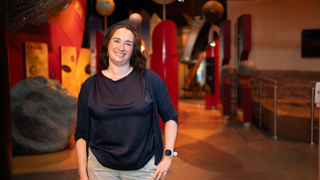
Thanks for joining me Sarah! So what does it mean to be a Space Expert and what is your connection to the National Space Centre?
Well I work at the University of Leicester, who have a close connection with the National Space Centre, so I have collaborated on a number of projects here. Most notably I’ve attended the Space Lates evenings as a guest speaker and given talks on subjects like exoplanets, the James Webb Space Telescope and other science projects that I’ve worked on. I’m here quite often and I think at some point my name found its way onto a list of possible candidates, and then I was asked if I would be a Space Expert with the responsibility for “looking out”. It’s really an honour to be asked to do this but also quite a big responsibility!
And what does “looking out” mean?
It encompasses things like space probes, ground-based radars, or anything that looks out into the universe. The Hubble Space Telescope, Euclid, and JWST all fall under my remit, as well as ground-based telescopes. My responsibility is to talk to the National Space Centre’s Board of Trustees and tell them about state-of-the-art things that are happening both right now but also what’s coming up within the next 5 years, so that the charity is prepared to plan events and put on any exhibitions that would complement the science.
Do you work at Space Park Leicester a lot?
Yes, I’m based at the main University campus but I’m at Space Park Leicester a lot at the moment. So I’m only around the corner!
You’ll have to drop in! Why are Space Experts important for the National Space Centre?
The Board of Trustees here oversee everything that’s planned and takes place here, and they tend to not be scientists, nor astronomers. So my job is to fill in the background and appreciation of the astrophysics to help them make decisions regarding the National Space Centre.
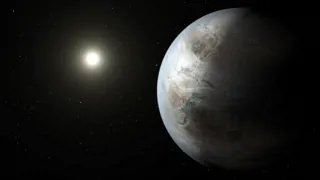
Can you tell me about your background in space?
Well my background in space is quite traditional. I did a degree in Physics at the University of Leicester and stayed on to complete a PhD in Astrophysics. I then worked on numerous projects as a researcher, looking at brown and white dwarf stars, and I also worked a little bit on the planning phase for a space mission called Sirius that hopefully will launch before too long.
I think working on the space missions gave me this broader appreciation as to how other aspects of the space sector work beyond just my astrophysical research. Eventually I got a research fellowship and became an academic.
Are there any upcoming space missions that you’re particularly excited about?
Good question! So the big one from my research field are Plato and Ariel, which are missions that I’m involved in and I’m actually in the science team for Ariel. They will launch in 2026 and 2029, respectively. Plato is a transiting mission looking for new exoplanets, and ideally it will find Earthlike planets orbiting stars that are similar to our own. Ariel is an exoplanet atmosphere categorisation mission, so it’s looking into the atmospheres of exoplanets to find out what they are made of and how similar to each other they all are. We know that giant planets in our own solar system, like Jupiter, are not remotely similar to each other. So we need to study other giant exoplanets to find out more about them and see if this is a trend.
For the uninitiated, what is an exoplanet?
Put simply, an exoplanet is a planet that orbits a star that is not our own sun. A lot of these that we find at the moment are Jupiter-sized planets that go around their star every few days and are very close to their sun. We don’t have something like that in our solar system; the giant planets in our solar system are very far out, like Jupiter and Saturn.
Am I right in thinking that we’ve found planets very similar to Earth?
Yes! There have been a few planets suggested as Earth twins that we’ve found, although the more we look for them, the more we are finding. We call them Super-Earths and sub-Neptunes; to put it simply, if they’re gassy then they’re sub-Neptunes, if they’re rocky then they’re Super-Earths. They seem to be incredibly numerous, but they’re very hard for us to observe because they’re much smaller than the hot Jupiters. But they’re out there, and that’s incredibly exciting.
And do you think there’s any chance that there’s a Marketing Administrator and Space Expert having a conversation like this on one of those planets?
Who knows! Our solar system seems to has very specific criteria for our life to have developed, so I guess it’s not unusual to assume that elsewhere in the universe there is a planet that had similar criteria. But also life doesn’t have to look like what we’re used to.
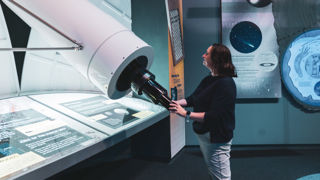
Have you always been interested in space?
Yes, I grew up on the border between Staffordshire and Cheshire. We drove to school every morning and I could see Jodrell Bank on the Cheshire plain on the way to school. That was my introduction to science and we went to the science centre when I was 7 or 8. I came home with an Astronomy in your Backyard book. I was really into it as a kid, and then I lost interest as I got a bit older and wanted to do other things, like being a doctor or a vet.
When I was 13, my parents dragged me to watch Apollo 13 at the cinema. I begrudgingly went and came out of the cinema thinking “I want to do that”, all that problem-solving and thinking creatively to make things work really appeals to me and that’s the sort of thing I wanted to do.
From then on I did work experience at Jodrell Bank, where I was introduced to how the telescope worked. I did things like get the data for the atomic clock, I did an experiment looking at hydrogen in the universe using one of the radio telescopes. I got an appreciation for what a day-to-day job as a scientist involves at 15, and then I went to space school at Kingston when I was 17 or 18.
What was space school like?
I loved it! It was a week where you stayed in halls of residence and your days were filled with lectures and practicals related to space. It meant that I was able to go around a satellite and spacecraft manufacturer and we saw equipment in the clean room. It was also my first time away from home outside of a school context, it was a lot of fun.
Would you like to go to space if you had the opportunity?
That’s an easy answer for me: no! When I came out of seeing Apollo 13, I knew I wanted to be a mission control. Going to space just doesn’t appeal to me. I would love to see the Earth from space, but I like being on Earth too much, enjoying being outside and the natural world.
No time to think – what’s a cool space fact?
Oh blimey! The coolest brown dwarves are the same temperature as a pizza oven.
Are you a fan of Science Fiction or stories set in space? Any recommendations?
Yeah definitely! I think sometimes get quite wound up about things not being realistic enough, but I think you have to put that to one side and just enjoy the story. I love The Expanse, I’m making my way through the series. My kids love Star Wars and I grew up watching Star Trek – I love the optimism of the future, they can solve all the problems with cooperation.
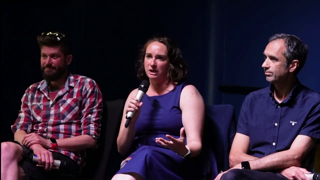
What is your favourite thing about space?
I think that everyone can look up, and that the longer you look the more you see – and that this is the same for professional astronomy too – we are seeing further than ever before, but there is still so much more to see and understand!
What is the best thing you’ve ever seen through a telescope?
Probably Neptune! We observed it to look at the clouds with a space telescope and got ground based images from Hawaii at the same time. My stars mostly look like dots so it was amazing to see a solar system planet! (The new Euclid images are pretty stunning too)
Do you have a favourite exoplanet?
Yes, but it’s not an exoplanet! It’s an irradiated brown dwarf called Kelt-1b. It’s a bit bigger than Jupiter but 27 times as massive and orbits a star a bit warmer than the sun.
How do you find being a guest at our Space Lates?
I love the relaxed atmosphere, it’s really nice to be able to wander around and chat with people and answer questions that aren’t too serious. When I did the JWST talk, I knew that the mirror was roughly the same size as my 7-year-old so I got a child from a Beaver group from the front row to come up and stand on stage so I could give a rough estimate of the size of the mirror. It’s really fun to be able to do things like that.
Do you have any advice for anyone wanting to get into STEM as a career path, especially women?
I’d say just go for it. Don’t let people put you off if it’s what you want to do. It’s very easy for people to suggest things aren’t for you or that you won’t fit in because your face doesn’t fit. That might be because you’re a woman or because you’re of a different racial minority, or you’re LGBTQ+. But we are richer for people from different backgrounds and different ways of thinking, it is how we move forward. We do need diversity within science and it’s important that people have the confidence to do that.
What does #SpaceForEveryone mean to you?
I think it means that nobody should be excluded from being involved in what we do or feel unwelcome at places like the National Space Centre. Space is for everybody and you shouldn’t feel pigeonholed because of your background or family or even education. I work a lot with citizen scientists and I was giving a talk here and asked for some quotes and there so many people who said they were put off being a scientist because it didn’t pay well in their country, or their results weren’t quite good enough and citizen science has allowed them to be a part of science and contribute despite that. I think that’s what’s really powerful about space.
Huge thanks to Sarah for taking the time out of her busy schedule to talk to me.
Stay tuned for more blog posts where I will be meeting other 3 other Space Experts, and check our What's On page for information on our next Space Lates event.

